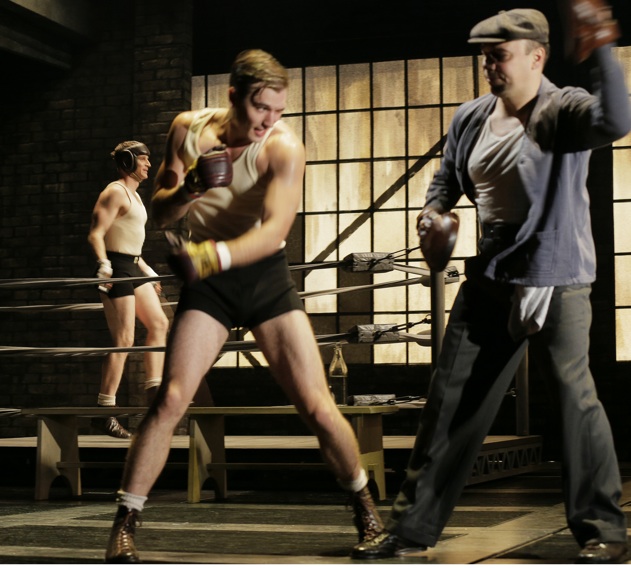In today’s Wall Street Journal “Sightings” column I discuss the latter-day decline and fall of the large-cast play. Here’s an excerpt.
* * *
 What will be the most frequently produced American play of the 2013-14 season? I’m betting on David Ives’ “Venus in Fur,” a smart, serious comedy about the role of power in sexual relationships. Not only is it terrific, but “Venus in Fur” requires only two actors, making it cheap to produce. No wonder everybody wants to do it.
What will be the most frequently produced American play of the 2013-14 season? I’m betting on David Ives’ “Venus in Fur,” a smart, serious comedy about the role of power in sexual relationships. Not only is it terrific, but “Venus in Fur” requires only two actors, making it cheap to produce. No wonder everybody wants to do it.
Theater professionals know all too well that few American companies are willing to take a chance on large-cast plays nowadays. Because of the recession, regional companies have grown steadily more risk-averse, and playwrights who long to see their work performed onstage are responding accordingly by writing smaller-scaled shows….
It’s easy to forget that the latter-day dominance of the small-cast play is a fairly recent development in theatrical history. Large casts used to be the rule, not the exception. Indeed, most of the best-known American plays of the 20th century called for performing forces that would now be seen by penny-pinching producers as insanely extravagant. Tennessee Williams’ “A Streetcar Named Desire,” for instance, was written for a cast of 12, while Arthur Miller’s “Death of a Salesman” requires 13 actors, eight men and five women. As for Thornton Wilder’s “Our Town,” it’s usually performed by some two dozen actors, and the original 1938 Broadway production fielded a cast of 51!
 Might we have lost something by forcing contemporary playwrights to work on a smaller canvas? In recent months I’ve seen revivals of three large-cast plays originally written in the Thirties and Forties that offer a priceless reminder of how things used to be….
Might we have lost something by forcing contemporary playwrights to work on a smaller canvas? In recent months I’ve seen revivals of three large-cast plays originally written in the Thirties and Forties that offer a priceless reminder of how things used to be….
Most impressive of all was Lincoln Center Theater’s revival of Clifford Odets’ “Golden Boy,” a 19-character play about the rise and fall of an ambitious young boxer that was originally produced on Broadway in 1939. By enacting his modern tragedy on the largest possible physical scale, Odets gave near-operatic scope to what might have ended up being an over-obvious story of ambition gone astray….
* * *
Read the whole thing here.
Archives for 2013
TT: Almanac
“Happiness is beneficial for the body, but it is grief that develops the powers of the mind.”
Marcel Proust, The Past Recaptured
TT: So you want to see a show?
Here’s my list of recommended Broadway, off-Broadway, and out-of-town shows, updated weekly. In all cases, I gave these shows favorable reviews (if sometimes qualifiedly so) in The Wall Street Journal when they opened. For more information, click on the title.
BROADWAY:
• Annie (musical, G, reviewed here)
• Hands on a Hardbody (musical, G/PG-13, reviewed here)
• Once (musical, G/PG-13, nearly all performances sold out last week, reviewed here)
OFF BROADWAY:
• All in the Timing (comedy, PG-13, extended through Apr. 28, reviewed here)
• Avenue Q (musical, R, adult subject matter and one show-stopping scene of puppet-on-puppet sex, reviewed here)
• Donnybrook! (musical, G/PG-13, suitable for children capable of enjoying a love story, closes Apr. 28, reviewed here)
• The Fantasticks (musical, G, suitable for children capable of enjoying a love story, reviewed here)
• The Madrid (drama, PG-13, closes May 5, reviewed here)
• Passion (musical, PG-13, extended through Apr. 19, reviewed here)
• The Revisionist (drama, PG-13, extended through Apr. 27, reviewed here)
• Talley’s Folly (drama, PG-13, closes May 12, reviewed here)
CLOSING SOON IN SARASOTA, FLA.:
• You Can’t Take It With You (comedy, G, closes Apr. 20, original production reviewed here)
CLOSING SOON OFF BROADWAY:
• Belleville (drama, R, closes Apr. 14, reviewed here)
• Happy Birthday (comedy, PG-13, closes Apr. 14, reviewed here)
CLOSING SOON IN LOS ANGELES:
• Tribes (drama, PG-13, remounting of original off-Broadway production, closes Apr. 14, original production reviewed here)
CLOSING SATURDAY OFF BROADWAY:
• The Old Boy (drama, PG-13, reviewed here)
TT: Almanac
“The love of justice is simply in the majority of men the fear of suffering injustice.”
François de La Rochefoucauld, Reflections; or Sentences and Moral Maxims (No. 78)
TT: Snapshot
Evelyn Waugh is interviewed by John Freeman on Face to Face, originally telecast by the BBC in 1960:
(This is the latest in a series of arts-related videos that appear in this space each Monday and Wednesday.)
TT: Almanac
“But it is notorious that the memory strengthens as you lay burdens upon it, and becomes trustworthy as you trust it.”
Thomas De Quincey, Confessions of an English Opium-Eater
TT: Lookback
From 2003:
Sometimes it’s all too clear that a collector’s interests are fiduciary–that he wants to maintain the value of an object for which he may have paid dearly. More often, though, I think their intentions are reasonably pure. If we think a house or painting or photograph or ballet is beautiful, we want it with us always. But the catch is that the more pieces of the past we succeed in preserving, the less space and time we have in which to display and contemplate the present. Too many lovers of art live exclusively in the past. I understand the temptation–I feel it myself–but it strikes me that we have an obligation to keep one eye fixed in the moment, and that becomes a lot harder to do when you’re pulling a long, long train of classics of which the new is merely the caboose….
Read the whole thing here.
TT: Almanac
“Memory itself is an internal rumour; and when to this hearsay within the mind we add the falsified echoes that reach us from others, we have but a shifting and unseizable basis to build upon. The picture we frame of the past changes continually and grows every day less similar to the original experience which it purports to describe.”
George Santayana, The Life of Reason
